You’re lying in bed, relaxed and ready to go to sleep. Suddenly you hear your cat trill as it jumps up onto your bed. You feel it walk around, searching for a comfy spot to curl up on, and then you feel paws and a heavyweight on your chest.
Your cat has surveyed the area and, for whatever reason, determined that the most comfortable place to lay its head is right on top of your chest. It’s a behavior that can be charming at first, but sometimes it’s inconvenient or even downright uncomfortable.
Claws may dig into your skin and cat breath gets exhaled into your face. Depending on the size of the cat, breathing may become difficult. All that extra weight can prevent your lungs from expanding fully, and with your face so close the risk of inhaling cat fur is all too immediate.
[amazon bestseller=”cat sleeping bag”]
Why has your cat chosen your chest to lay down on? What makes it so much more appealing than all the other spots it investigated? Let’s find out why your cat loves to lay on your chest and learn more about the surprising benefits this behavior can have for everyone involved.
Creature Comforts: How Cats Get Cozy
Heat Seekers
Cats love warmth and tend to seek out the warmest spot in the room, whether they’re about to sleep or just looking for a place to plop down for a bit. You can observe your cat changing locations throughout the day based on the temperature. It favors whichever window lets the most sunlight through and may steal your spot on the couch if you get up – you warmed it up so nicely!
Your body gives off a lot of heat, especially when you’re wearing cozy pajamas and wrapped up in blankets. Even without bedding, beds are a lot warmer than the floor simply because heat rises and they’re higher up.
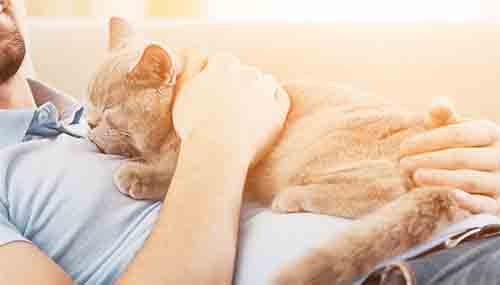
So your cat is naturally drawn to your bed, and from there to you, because you’re the greatest source of heat it can detect. Your chest is particularly warm (it contains your heart, after all) and perfectly sized to fit a cat on top of it. It might as well be a magnet for felines!
Bodily Rhythms
When they’re young, cats spend much of their time in contact with their mothers. When a kitten curls up next to (or on top of) its mother, it can feel her heartbeat and hear her breathing. Being so close allows the kitten to absorb her warmth and listen to her gentle, soothing purrs and rumbles.
A mother cat’s body seems designed to instill calm and comfort in her kittens. It’s like a feline lullaby, erasing all worries and inducing a state of deep relaxation and, before long, sleep.
Having been conditioned from birth to find immense comfort in these things, cats continue to seek them out throughout the rest of their lives. Bonded cats will often snuggle up next to each other when it’s naptime, but humans make good cuddle partners too.
Curled up on your chest, your cat becomes hypnotized by the rhythms of your breathing and heartbeat. Focused on these repetitive sensations, it’s not long before the cat drifts off to sleep. Perhaps you remind your cat of its mother – large, soft and with a built-in lullaby on repeat all night long.
[amazon bestseller=”cat bed”]
A Matter of Security: Your Cat Wants to Feel Safe and Secure
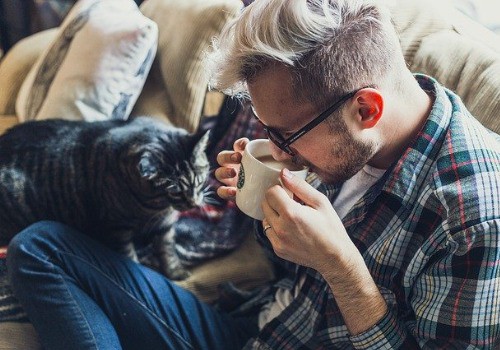
Cats maintain some alertness even while they’re sleeping – their ears and noses remain functional in order to detect danger – but bedtime still leaves them vulnerable. Sure, there are no predators in your house, but your cat’s instinct tells it to always sleep in the safest spot it can find.
If this spot happens to be your chest, that’s a sign of deep trust. Not only does your cat know that you won’t hurt it, it considers you to be the safest thing it can find. For cats, who are notoriously timid and wary of anything that could possibly cause harm, this is a compliment of the highest degree.
Everybody Wins: Why You Want Your Cat to Sleep on You
A Slumber Party with Friends
The bond you share with your cat goes deeper than a mere sense of security. Cats may trust that certain people won’t hurt them, but that doesn’t mean they automatically like them. A cat needs to see you as more than a protector in order to sleep on your chest; it needs to see you as a true friend.
[amazon bestseller=”cat safe carrier”]
Each individual cat has its own criteria for friendships, but there are certain qualities it probably sees in you if it chooses you to curl up on. You smell good – cats have sensitive noses and like themselves to smell a certain way, so if it’s lying on you that means it’s fine with picking up your scent. And you’ve probably proven that you know how to provide a comforting touch, not petting it too roughly or in the wrong spots.
By sleeping on you, the cat is affirming your friendship and showing you that it reciprocates the love and affection you’ve shown it. Even if it’s a little uncomfortable, the intent is pure. You make your cat feel warm and fuzzy both physically and emotionally.
The Perfect Purr
Some people believe that cat purrs have benefits for humans. Beyond simply sounding neat and providing reassurance that your cat is comfortable with you, purrs may actually have healing powers. They occur at frequencies that have been shown to promote healing and increase bone density.
This special form of healing has obvious benefits for the cat doing the purring, but the effects may carry over to you. When your cat curls up on your chest and purrs itself to sleep, the frequencies travel into your body; that’s why you can feel the purrs deep inside you.
Further studies are needed before this theory of healing is proven, but either way, purring is a comforting sound. Just as the sound of your gentle breathing helps lull your cat to sleep, so too does its purring help you relax and catch some shuteye of your own.
Full Body Contact: Other Sleeping Spots
A Head Start
Chests aren’t the only body parts that cats enjoy sleeping on. Your cat may prefer to curl up on your pillow, wrapping its body around your head.
Nobody knows for sure why cats sleep on their owners’ heads, but some may do so solely for practical reasons. Cats tend to be light sleepers, and someone who tosses and turns all night would not be pleasant to sleep on.
The desire for close contact and warmth remains, though, and the cat determines that the safest place to sleep is on its owner’s head. The head tends to be the most stationary part of the body during sleep, but it still radiates warmth and smells comforting. Waking up with your cat’s tail flicking in your face isn’t ideal, but it’s still a sign of love and a result of the cat’s desire to be close to you.
Lap Cats
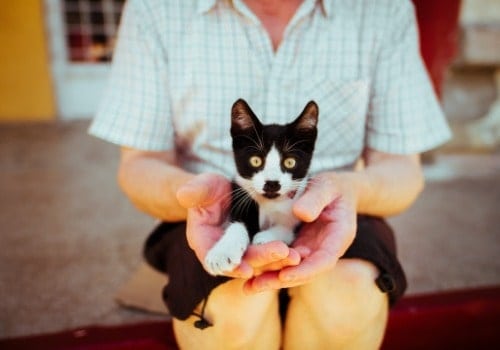
If you’re not lying down but your cat still wants to sleep on you, your lap is the prime location. It still provides the warmth that cats crave, even if it’s not quite as comfortable as your chest.
[amazon bestseller=”cat tree”]
One bonus of sleeping in your lap: it’s the perfect position for receiving a gentle pre-nap petting. Unfortunately, it can be a bit inconvenient as well, since it’s tough to move with a sleeping kitty in your lap. Laps may be great for short naps but anything longer tends to end prematurely, which still doesn’t stop cats from trying anyway!
"In ancient times cats were worshipped as gods; they have not forgotten this."
-- Terry Pratchett

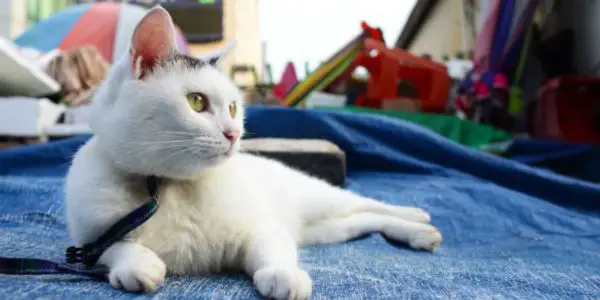

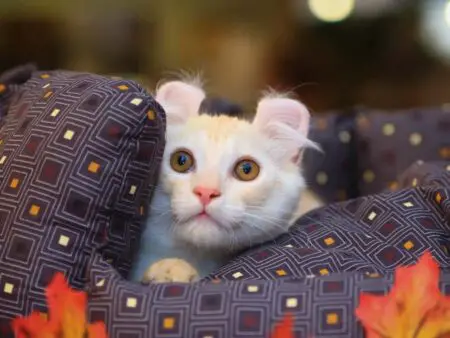


Oh my goodness! Awesome article dude! Many thanks!
It’s a shame you don’t have a donate button! I’d definitely donate to this fantastic blog! I guess for now i’ll settle for talking about this blog with my Facebook group.